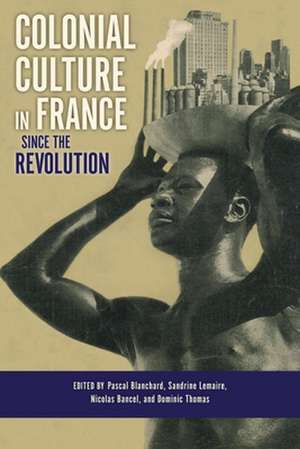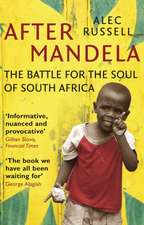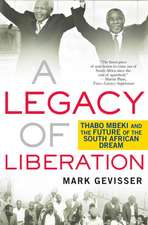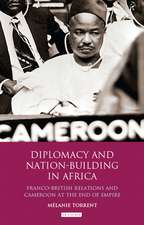Colonial Culture in France since the Revolution
Autor Pascal Blanchard, Sandrine Lemaire, Nicolas Bancel, Dominic Thomasen Limba Engleză Hardback – dec 2013
Preț: 404.67 lei
Nou
Puncte Express: 607
Preț estimativ în valută:
77.44€ • 84.09$ • 65.05£
77.44€ • 84.09$ • 65.05£
Carte tipărită la comandă
Livrare economică 22 aprilie-06 mai
Preluare comenzi: 021 569.72.76
Specificații
ISBN-13: 9780253010452
ISBN-10: 0253010454
Pagini: 592
Dimensiuni: 160 x 236 x 46 mm
Greutate: 1.07 kg
Editura: MH – Indiana University Press
ISBN-10: 0253010454
Pagini: 592
Dimensiuni: 160 x 236 x 46 mm
Greutate: 1.07 kg
Editura: MH – Indiana University Press
Cuprins
Introduction: The Creation of a Colonial Culture in France, from the Colonial Era to the "Memory Wars" / Pascal Blanchard, Sandrine Lemaire, Nicolas Bancel, and Dominic ThomasPart I. The Creation of a Colonial CultureForeword: French Colonization: an Inaudible History Marc Ferro1. Anti-Slavery, Abolitionism, and Abolition in France from the End of the Eighteenth Century to the 1840s Marcel Dorigny2. Milestones in Colonial Culture under the Second Empire (1851-1870) Sandrine Lemaire, Pascal Blanchard, and Nicolas Bancel3. Exhibitions, Expositions, Media Coverage, and the Colonies (1870-1914) Sandrine Lemaire and Pascal Blanchard4. Science, Scientists, and the Colonies (1870-1914) Gilles Boëtsch5. Literature, Song, and the Colonies (1900-1920) Alain Ruscio6. Entertainment, Theater, and the Colonies (1870-1914) Sylvie Chalaye7. School, Pedagogy, and Colonies (1870-1914) Gilles Manceron8. Dying: the Call of the Empire (1913-1918) Éric DerooPart II. Conquering Public OpinionForeword: Historys Mark (1931-1961) Didier Daeninckx9. Dreaming: the Fatal Attraction of Colonial Cinema (1920-1950) Olivier Barlet and Pascal Blanchard10. Spreading the Word: the Agence Générale des Colonies (1920-1931) Sandrine Lemaire11. To Civilize: the Invention of the Native (1918-1940) Nicolas Bancel and Pascal Blanchard12. Selling the Colonial Economic Myth (1900-1940) Catherine Coquery-Vidrovitch13. The Athletic Exception: Black Champions and Colonial Culture (1900-1939) Timothée Jobert, Stanislas Frenkiel, and Nicolas Bancel14. The Colonial Bath: Sources of Popular Colonial Culture (1918-1931) Nicolas Bancel15. The Colonial Exposition (1931) Steve Ungar16. National Unity: the Right and Left "Meet" around the Colonial Exposition (1931) Pascal BlanchardPart III. The Apogee of ImperialismForeword: Images of an Empires Demise Benjamin Stora17. Colonizing, Educating, Guiding: A Republican Duty Françoise Vergès18. Promotion: Creating the Colonial (1930-1940) Sandrine Lemaire19. Influence: Cultural and Ideological Agendas (1920-1940) David Murphy, Elizabeth Ezra, and Charles Forsdick20. Education: Becoming "Homo Imperialis" (1910-1940) Nicolas Bancel and Daniel Denis21. Manipulation: Conquering Taste (1931-1939) Sandrine Lemaire22. Control: Paris, a Colonial Capital (1931-1939) Pascal Blanchard and Éric Deroo23. Imperial Revolution: Vichys Colonial Myth (1940-1944) Pascal Blanchard and Ruth Ginio24. Colonial Economy: Between Propaganda Myths and Economic Reality (1940-1955) Sandrine Lemaire, Catherine Hodeir, and Pascal Blanchard25. French Unity: The Dream of a United France (1946-1960) Jacques FrémeauxPart IV. Toward the PostcolonyForeword: Moussa the Africans Blues Abdourahman A. Waberi26. Decolonizing France: the "Indochinese Syndrome" (1946-1954) Daniel Hémery27. Immigration: the Emergence of an African Elite in the Metropole (1946-1961) Philippe Dewitte28. Immigration: North Africans Settle in the Metropole (1946-1961) Pascal Blanchard, Éric Deroo, Driss El Yazami, Pierre Fournié, and Gilles Manceron29. Crime: Colonial Violence in the Metropole (1954-1961) Jean-Luc Einaudi30. Modernism, Colonialism, and Cultural Hybridity Herman Lebovics31. The Meanders of Colonial Memory Nicolas Bancel and Pascal Blanchard32. The Impossible Revision of Frances History (1968-2006) Suzanne Citron33. National History and Colonial History: Parallel Histories (1961-2006) Sandrine Lemaire34. The Illusion of Decolonization (1956-2006) Jean-Pierre Dozon35. The Impossible Colonial Museum Robert AldrichPart V. The Time of InheritanceForeword: The Age of Contempt, or the Legitimization of Frances Civilizing Mission Bruno Etienne36. Trouble in the Republic: Disturbing Memories, Forgotten Territories Françoise Vergès37. Competition between Victims Esther Benbassa38. The Army and the Construction of Immigration as a Threat (1961-2006) Mathieu Rigouste39. Postcolonial Culture in the Army and the Memory of Overseas Combatants (1961-2006) Christian Benoît, Antoine Champeaux, and Éric Deroo40. Republican Integration: Reflections on a Postcolonial Issue (1961-2006) Vincent Geisser41. Colonial Influences and Tropes in the Field of Literature Jean-Marc Moura42. From Colonial History to the Banlieues (1961-2006) Dominique Vidal43. Can We Speak of A Postcolonial Racism? (1961-2006) Saïd Bouamama and Pierre Tévanian44. From Colonial Stereotypes to the Postcolonial Gaze: the Need for an Evolution of the Imaginary Dominique Wolton45. Post Colonial Cinema, Song, and Literature: Continuity or Change? (1961-2006) Delphine Robic-Diaz and Alain Ruscio46. Ethnic Tourism: Symbolic Reconquest? (1961-2006) Nicolas Bancel47. Francophonie and Universality: the Evolution of Two Entangled Ideas (1961-2006) Gabrielle ParkerBibliographyIndexContributors
Recenzii
"Colonial Culture in France since the Revolution examines several aspects of French colonialism as well as its post-colonial heritage. The collection includes contributions by scholars and literary figures alike." Charles Tshimanga-Kashama, University of Nevada, Reno
Notă biografică
Descriere
This re-examination of French colonial culture, provides the basis for a revised understanding of its cultural, political, and social legacy











